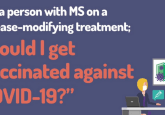COVID-19: the impact of the coronavirus pandemic on mental health and what we can all do

COVID-19 – an infectious disease caused by SARS-CoV-2 – has dominated the headlines since its emergence in December 2019. Since then, it has spread globally and resulted in a pandemic that not only has impacted the global economy and our day-to-day lives, but also for some of us, our mental health. While staying up to date and informed about the coronavirus pandemic and the latest public health measures is important, it’s also essential to look after ourselves and those around us.
In this article, I take a look at how the coronavirus pandemic has affected society and the negative effects it is having on mental health for some individuals, as well as provide tips on how we can get through this time together. As the mental health implications of COVID-19 will impact everyone differently, I can only speak from personal experience and information gathered from research. Please be sure to look after yourself and each other during this period of uncertainty, and if you have any suggestions to add to the below then get in touch!
Social media and news updates
Constant updates about coronavirus, especially those concerning confirmed cases and the number of deaths to date, can be extremely overwhelming and feel relentless. Moreover, rumors and speculation can add fuel to anxiety, which is why obtaining good quality information is so important [1].
Finding a balance between digesting important updates on COVID-19 while reducing information that can cause us to feel depressed is fundamental. A few suggestions that can be helpful when sifting through coronavirus updates include:
✅ Seeking trustworthy and reliable information (e.g., the WHO, NHS website, CDC)
✅ Avoiding speculation and looking up reputable sources (e.g., Gov.uk)
✅ Taking breaks from social media and muting triggering keywords/accounts
✅ Muting group chats and hiding posts if they’re too overwhelming
✅ Limiting time spent on news platforms and social media
✅ Sharing any positive stories that you come across
Self-isolation, social distancing and quarantine
There has been a wealth of information shared across all platforms about the main symptoms of COVID-19 and what to do if you are experiencing symptoms. But the terms ‘self-isolation’, ‘social distancing’ and ‘quarantine’ have been used quite interchangeably. For example, people may refer to putting themselves into self-isolation, when they mean that they are practicing social distancing and others might use the phrase quarantine to describe their situation when self-isolation or social distancing is more accurate.
Whilst these phrases can be used in a light-hearted way, it’s important that people understand the differences between the terminology they use and the affect it can have on those around them.
Social distancing refers to the avoidance of unnecessary contact with other people in order to reduce transmission. These measures involve people who are not exhibiting symptoms and may include: avoiding contact with individuals who display symptoms, avoiding non-essential travel, avoiding large gatherings and gatherings in small places, and working from home where possible [2].
Self-isolation, on the other hand, refers to individuals who are isolating themselves due to potential exposure to COVID-19 and can include people with or without symptoms of infection [3]. This includes not going to work, school or public places; not using public transport; not having visitors over and not going out to buy food or collect medicines [4].
The term ‘quarantine’ can often be scary but is an effective method used by the government to stop the spread of contagious diseases such as COVID-19 [5]. Quarantines are for people, or groups of people, who have been exposed to the virus but who may not yet have symptoms. This is different to ‘isolation’, which is a term reserved for individuals who may or may not be contagious [5].
Social distancing aims to reduce transmission in people who aren’t displaying symptoms, self-isolation involves those who may or may not have been exposed to the virus and quarantine refers to people without symptoms who have been exposed to the virus.
Saying to people around us that we’re ‘social distancing’, ‘self-isolating’ or ‘in quarantine’ may lead to negative emotions if these terms are not used correctly. For example, using the term quarantine to describe one’s situation can be misleading and induce fear if that person leaves their house to buy food. This could lead to others feeling anxious about leaving their house over concerns that people are not being cautious or taking preventative measures seriously. This then leads to a feeling of fear and forced isolation where it may not be required.
No matter which of the above situations we might find ourselves in, there are a myriad of suggestions that can help. These include, but are not limited to:
✅ Staying connected with friends, family and colleagues via telephone and/or video calls (Zoom is a really great resource!); be sure to reach out to those around you and check up on people even if you’re not struggling yourself
✅ Keeping active – whether that’s venturing out for a run (perhaps not if in quarantine) or doing at-home exercises
✅ Drinking plenty of water and staying hydrated
✅ Trying to keep yourself busy – take up a new hobby, find an online course, experiment with cooking, read your favorite book or watch films
✅ Setting up a Netflix party with your partner or friends
A difference in atmosphere when staying or working at home
With governments encouraging some of the measures above, including encouraging institutions and companies to work remotely where possible, a number of us are finding ourselves working from home or being at home more often than usual. For a lot of us, there isn’t an end date on when we can expect to physically return to work or be told we can stop social distancing or self-isolating. Could this be weeks of staying at home, or even months? The answer remains unknown and with this, comes a whole plethora of thoughts and emotions.
Everyone’s experience of working or staying at home will be different and thus, the impact that this could have on any one person might be different for another. Some people will have a support system around them including friends, family and pets, whereas others will be more alone. The latter can feel very surreal, as the feelings of loneliness and isolation can be heightened. For individuals who struggle with mental health issues this can be a scary situation as they are likely to struggle more during this time and feel more isolated. Thus, people with mental illnesses may experience worsened symptoms from self-isolation but also, it could spark the onset of mental health issues for individuals who haven’t encountered them before.
Additionally, for those of us who are far away from home living and working in another country, this could raise concerns for our families and friends abroad owing to the uncertainty as to when we’ll be able to see them again. All of this can add to lower morale and might also lead to a physical and emotional sense of withdrawal from the world and people around us.
The impact that self-isolation and social deprivation can have on mental health shouldn’t be disregarded or underestimated. In these situations, it’s so important to look after yourself and those around you by considering not only the points mentioned previously but also:
✅ Sticking to a routine – get up, shower, eat breakfast, get dressed and take a quick walk before work
✅ Establishing boundaries – if possible, keep your workspace separate from your eating/sleeping spaces
✅ Taking frequent breaks – refresh your mind, grab a hot drink or get away from your thoughts for a bit
✅ Setting small goals – being at home comes with a lot of distractions so be sure to set yourself realistic expectations on what you can achieve and don’t feel disappointed if it didn’t get done
✅ Supporting your team members – if you’re a manager, take a look at Mind’s top tips for supporting your team’s wellbeing, including yours, here >>>
Looking after our mental health is of extreme importance in general but is especially imperative now during the COVID-19 outbreak – whether that’s finding ways to manage information we’re receiving from news and social media, to staying connected with friends, family, loved ones and colleagues. It’s also important to note that there are many other avenues in which the coronavirus pandemic can impact mental health that hasn’t been covered in this article (e.g., working from home whilst juggling home schooling to job loss and unemployment stress).
Thus, my key takeaway message to everyone in all situations is to be kind to yourself and others. Look after yourself and those around you by finding and providing support and consider the points above to help. We will get through all of this together.
[1] Mental Health Foundation. Looking after your mental health during the coronavirus outbreak.
www.mentalhealth.org.uk/publications/looking-after-your-mental-health-during-coronavirus-outbreak
[Accessed 20 March 2020]
[2] Public Health England. Guidance on social distancing for everyone in the UK and protecting older people and vulnerable adults.
www.gov.uk/government/publications/covid-19-guidance-on-social-distancing-and-for-vulnerable-people/guidance-on-social-distancing-for-everyone-in-the-uk-and-protecting-older-people-and-vulnerable-adults
[Accessed 20 March 2020]
[3] Public Health England. Self-isolation.
https://assets.publishing.service.gov.uk/government/uploads/system/uploads/attachment_data/file/869144/Self-isolation_poster_for_patients.pdf
[Accessed 20 March 2020]
[4] National Health Service. Stay at home advice.
www.nhs.uk/conditions/coronavirus-covid-19/self-isolation-advice/
[Accessed 20 March 2020]
[5] Medical Associates. COVID-19: quarantine, isolation, and social distancing.
www.mahealthcare.com/coronavirus/covid-19-quarantine-isolation-and-social-distancing
[Accessed 20 March 2020]
You might also like:

